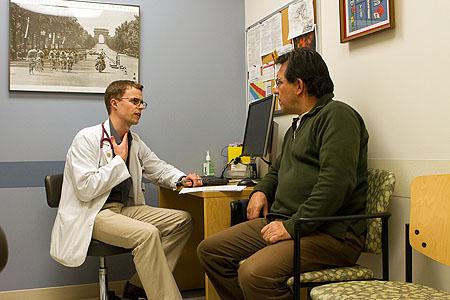Literacy Network Improves Adults’ Health Care Knowledge in WI

Literacy skills are a key predictor of an individual’s health status. After attending the 2009 Health Literacy Summit in Madison, WI, Literacy Network of Dane County developed English for Health, an award-winning program that helps adults with low literacy learn about good health habits, make informed decisions about their health care, and communicate effectively with their providers.
At the summit, Literacy Network staff discovered the Florida Literacy Coalition’s text Staying Healthy, which became the basis for the English for Health course’s curriculum. They also studied the collaborative guidelines for partnership development laid out by the Literacy Assistance Center in New York City. Ready to pilot English for Health, the Literacy Network followed the Literacy Assistance Center’s guidelines and gathered partners to help get things started. “Good partners are essential. We have several great health care partners, including the Latino Health Council, St. Mary’s Hospital, and Group Health Cooperative,” said Executive Director Jeff Burkhart. Literacy Network also partners with a local grocery co-op and UW-Madison Schools of Medicine and Public Health, Nursing and Pharmacy.
The pilot program offered instruction over 9 weeks; over time, the course grew to include 48 hours of health literacy instruction and practice over 12 weeks. Literacy Network instructors teach classes in a hospital or clinic twice a week, where staff offer tours of the facilities. English lessons are supplemented by health care professionals, including nurses, pharmacists and doctors, and medical students who provide tutoring and one-on-one support to students. Students learn how to advocate for themselves, understand where they can go for help, and efficiently utilize the public services offered in the community. The program includes a mock clinic where adult learners practice their skills with health care providers, allowing them to interact in a safe educational environment.
Providers also learn a great deal from the adult learners about effective communication. “By the end of this class I was learning as much from the students as they were from me…I had a much better grasp on how to ask questions, present information, and in general, just think about how to better care for patients,” said a medical student who participated in the program.
Developed with assistance from medical and pharmacy students at UW-Madison, the curriculum’s content and structure is adaptable to the needs, circumstances and interests of participants. Since 2009, English for Health has served more than 300 community members. Seventy-five percent of participants reported increased confidence with health care providers and 80% demonstrated an increased understanding of appropriate use of primary care, emergency room, urgent care, and health care options for the uninsured.
English for Health was recognized by the Wisconsin Department of Health Services in 2009 for improving minority health. The program has also received awards from Wisconsin Literacy, the University of Wisconsin-Madison and the Madison/Dane County Public Health Department. Organizations in Wisconsin, Alabama, Maryland and Georgia are using the “Teaching English for Health” curriculum guide to expand literacy in their communities. This guide includes 24 detailed lessons with step-by-step plans, multi-level class activities, 4 training videos, and a grant template.
For more information: http://www.litnetwork.org/programs/index.php?category_id=4496
Communities in Action provide examples of strategies or tools in action. Their purpose is to connect like-minded communities in their implementation efforts, giving insight into how others are tackling key challenges and what they've accomplished. To learn more about the evidence supporting this strategy's effectiveness or resources to help move towards implementation, see the What Works for Health summary of Health literacy interventions.
Date added: January 6, 2015
